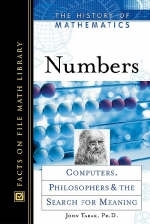
Numbers
Computers, Philosophers, and the Search for Meaning
Seiten
2004
Facts on File Inc (Verlag)
978-0-8160-4955-4 (ISBN)
Facts on File Inc (Verlag)
978-0-8160-4955-4 (ISBN)
- Titel ist leider vergriffen;
keine Neuauflage - Artikel merken
"Numbers" deals with the development of numbers from fractions to algebraic numbers to transcendental numbers to complex numbers and their uses.
One of the most fundamental concepts influencing the development of human civilization is numbers. While societies today rely on their understanding of numbers for everything from mapping the universe to running word processing programs on computers to buying lunch, numbers are a human invention. Babylonian, Roman, and Arabic societies devised influential systems for representing numbers, yet the story of how numbers developed is far more complicated. Concepts such as zero, negative numbers, fractions, irrational numbers, and roots of numbers were often controversial in the past. Numbers deals with the development of numbers from fractions to algebraic numbers to transcendental numbers to complex numbers and their uses. The book also examines in detail the number pi, the evolution of the idea of infinity, and the representation of numbers in computers. The metric and American systems of measurement as well as the applications of some historical concepts of numbers in such modern forms as cryptography and hand calculators are also covered.
Illustrations, thought-provoking text, and other supplemental material cover the key ideas, figures, and events in the historical development of numbers.
One of the most fundamental concepts influencing the development of human civilization is numbers. While societies today rely on their understanding of numbers for everything from mapping the universe to running word processing programs on computers to buying lunch, numbers are a human invention. Babylonian, Roman, and Arabic societies devised influential systems for representing numbers, yet the story of how numbers developed is far more complicated. Concepts such as zero, negative numbers, fractions, irrational numbers, and roots of numbers were often controversial in the past. Numbers deals with the development of numbers from fractions to algebraic numbers to transcendental numbers to complex numbers and their uses. The book also examines in detail the number pi, the evolution of the idea of infinity, and the representation of numbers in computers. The metric and American systems of measurement as well as the applications of some historical concepts of numbers in such modern forms as cryptography and hand calculators are also covered.
Illustrations, thought-provoking text, and other supplemental material cover the key ideas, figures, and events in the historical development of numbers.
John Tabak, Ph.D., performed graduate work at Suny at Stony Brook and received a degree in mathematics from Rensselaer Polytechnic Institute. He is the author of A Look at Earth and A Look at Neptune, two astronomy titles for middle school readers. He is presently writing a history of American sign language.
| Erscheint lt. Verlag | 1.6.2004 |
|---|---|
| Reihe/Serie | History of Mathematics |
| Zusatzinfo | 29 b&w photographs, 21 line drawings |
| Verlagsort | New York |
| Sprache | englisch |
| Maße | 152 x 229 mm |
| Gewicht | 522 g |
| Themenwelt | Mathematik / Informatik ► Mathematik ► Geschichte der Mathematik |
| ISBN-10 | 0-8160-4955-6 / 0816049556 |
| ISBN-13 | 978-0-8160-4955-4 / 9780816049554 |
| Zustand | Neuware |
| Haben Sie eine Frage zum Produkt? |
Mehr entdecken
aus dem Bereich
aus dem Bereich
a secret world of intuition and curiosity
Buch | Hardcover (2024)
Yale University Press (Verlag)
32,70 €
a global history of Mathematics & its Unsung Trailblazers
Buch | Softcover (2024)
Penguin Books Ltd (Verlag)
16,20 €
Das Jahrhundert, in dem die Mathematik sich neu erfand. 1870-1970
Buch | Hardcover (2022)
Heyne (Verlag)
22,00 €


